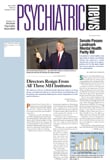Psychiatrists who are familiar with the stigma often attached to mental illness are now confronting stigma of another kind, said APA President Richard Harding, M.D., at a session at the APA Institute on Psychiatric Services in October.
That session, “Addressing Stigma: Responses After the September 11 Disaster,” focused on how incidents of bias are beginning to affect members of the psychiatric profession, particularly psychiatry residents who are members of non-Caucasian ethnic groups.
“The hospital used to be a safe environment for me,” said a New York City– based psychiatrist whose family came to the United States from Pakistan. After the recent terrorist attacks, however, she found that fear and prejudice threatened her ability to communicate with patients and her sense of comfort at work.
“Remember September 11!,” yelled the father of a patient she was seeing in the emergency room of a large New York City hospital. For a while the father’s hostility shut down her communication with her patient, she said. “The nurses were very upset for me.”
Her response? “During weekend rounds, I used to wear clothes that demonstrated my ethnicity. I no longer do that.”
Several participants mentioned anomalous situations that have developed as a result of the changed American reality. A resident from Jamaica said, “Because of my appearance, people often think I’m Indian. Patients ask me much more frequently where I’m from since September 11, and they seem relieved when I say I’m black.” Another participant noted, however, that people have been faster to accept ethnic stereotypes after the recent attacks than they were after the Oklahoma City bombing. “Nobody thought all blond, blue-eyed guys were bad after Oklahoma City.”
“Patients have told me that the rest of the country now can understand what insomnia and irritability mean. Many of those patients have lived with the kind of constant anxiety that we are just now experiencing,” said another participant. Another participant said that a patient told him, “I’ve felt under attack my whole life.”
Establishing appropriate boundaries between patient and psychiatrist has become particularly difficult since the terrorist attacks, because both share a sense of fear and uncertainty about the future. In contrast, some psychiatrists and others at the session found that patients in therapy groups have been less self-absorbed and more concerned about issues that affect the entire country.
“Many psychiatry residents are members of minority groups,” one participant noted. She recommended that APA send a “strong message” that the organization stands behind all the members of the psychiatric profession. “Develop PSAs [public service announcements] for radio and television that encourage understanding toward members of the minority groups that are under attack,” she suggested.
Another participant urged that the material on APA’s Web site at www.psych.org be updated more frequently and used to emphasize the organization’s commitment to tolerance and understanding.
A woman at the session who said she had “lived through three wars” spoke about the importance of using symbols appropriately.
“The Chinese symbol for danger also stands for opportunity,” said one participant. She noted that new funds through various sources are available for mental health services and encouraged APA to apply for that money. Darrel Regier, M.D., executive director of the American Psychiatric Institute for Research and Education, said that funding for disaster response through the Federal Emergency Management Agency is available only for crisis counseling and training. Subsequent funding for medium- and long-term mental health treatment services will come from the $40 billion in emergency funds that Congress appropriated for specific “needs assessment” plans developed by states and communities affected by the terrorist acts.
Harding closed the session by reminding the group that the “toughest thing” members can do during this crisis is to figure out how to help their own patients. ▪
